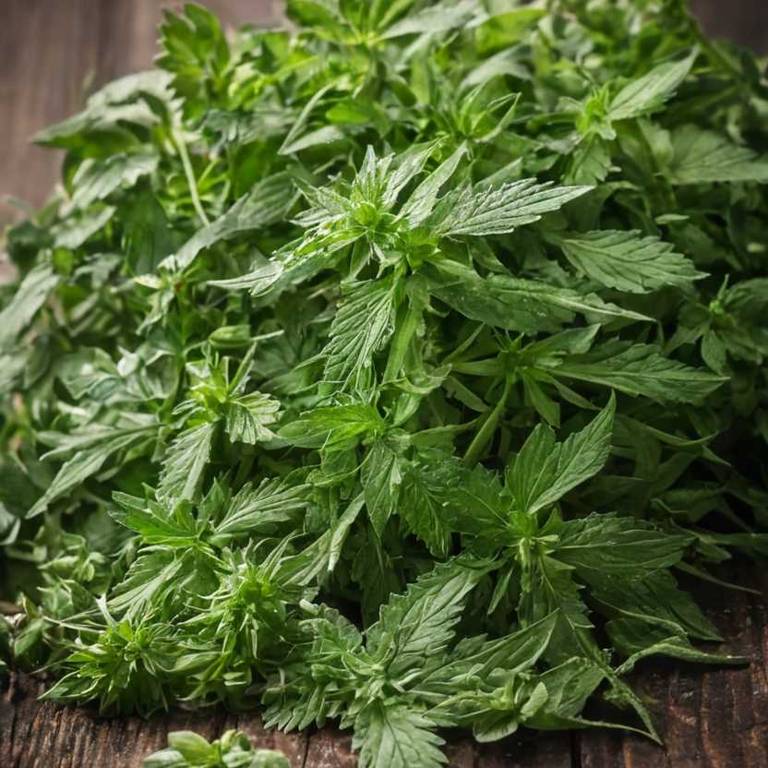By Leen Randell
Updated: Jul 06, 2024
10 Health Benefits Of Urtica Dioica (Stinging Nettle)

Urtica dioica, also known as stinging nettle, has health benefits such as reducing inflammation and relieving pain.
Its medicinal properties include the presence of flavonoids, lignans, and sterols, which exhibit anti-inflammatory and antioxidant effects. This can improve lives by alleviating symptoms of arthritis and other inflammatory conditions, allowing individuals to engage in daily activities without discomfort.
Additionally, its diuretic properties can also help in managing symptoms of urinary tract issues.
This article explains in details the 10 best health benefits of Urtica dioica.
1. Reduces inflammation
Urtica dioica reduces inflammation because of its rich content of bioactive compounds such as flavonoids, phenolic acids, and triterpenoid saponins.
These compounds have been shown to inhibit the production of pro-inflammatory molecules, such as cytokines and enzymes, while also promoting the synthesis of anti-inflammatory mediators.
This results in a reduction of inflammation and pain, making it a potential natural remedy for conditions like arthritis, allergies, and skin irritations.
2. Alleviates allergies
Urtica dioica alleviates allergies because of its unique properties.
The plant's natural chemicals, such as histamine and serotonin, have anti-inflammatory effects that help to reduce symptoms associated with allergic reactions. Additionally, the antioxidants present in nettle root may help to stabilize mast cells, reducing the release of histamine and other allergic mediators.
This natural approach can provide relief from common allergy symptoms like itching, sneezing, and congestion.
3. Supports kidney function
Urtica dioica supports kidney function because of its rich antioxidant and anti-inflammatory properties.
The plant's bioactive compounds, such as flavonoids and terpenoids, have been shown to reduce oxidative stress and inflammation in the kidneys, which can help mitigate kidney damage caused by chronic conditions like diabetes and hypertension.
Additionally, stinging nettle may also help improve blood flow and reduce scarring in the kidneys, further supporting overall kidney health.
4. Promotes prostate health
Urtica dioica promotes prostate health because of its rich antioxidant and anti-inflammatory properties.
The herb has been shown to reduce symptoms associated with benign prostatic hyperplasia (BPH) such as frequent urination and painful urination, by inhibiting the conversion of testosterone into dihydrotestosterone (DHT).
Additionally, stinging nettle may help reduce inflammation in the prostate gland, which can contribute to an enlarged prostate.
5. Eases joint pain
Urtica dioica eases joint pain because its natural anti-inflammatory compounds, such as flavonoids and carotenoids, work to reduce swelling and alleviate discomfort.
The plant's leaves and stems contain histamine, which blocks the production of prostaglandins, hormone-like substances that contribute to inflammation and pain.
As a result, stinging nettle extract can provide relief from symptoms associated with osteoarthritis, rheumatoid arthritis, and other joint conditions, promoting improved mobility and flexibility.
6. Stimulates hair growth
Urtica dioica stimulates hair growth because of its rich concentration of nutrients and antioxidants.
The plant's leaves contain vitamins A, C, and E, as well as iron and calcium, which promote healthy blood circulation and follicle function.
Additionally, nettle extract has been shown to increase the production of keratin, a protein essential for hair growth, while also reducing inflammation and oxidative stress that can contribute to hair loss.
7. Helps manage blood sugar
Urtica dioica helps manage blood sugar because of its potent antioxidant and anti-inflammatory properties.
The herb's bioactive compounds, such as flavonoids and phenolic acids, have been shown to improve insulin sensitivity and reduce glucose absorption in the gut, thereby regulating blood sugar levels.
Additionally, stinging nettle has been found to reduce oxidative stress and inflammation associated with type 2 diabetes, further supporting its role in maintaining healthy blood sugar levels.
8. Improves digestion
Urtica dioica improves digestion because it contains a unique combination of bioactive compounds that enhance gut motility and reduce inflammation.
The plant's leaf extracts have been shown to stimulate the release of digestive enzymes, increase gastric acid secretion, and soothe irritated mucous membranes, leading to improved nutrient absorption and reduced symptoms of irritable bowel syndrome (IBS).
Additionally, nettle's anti-inflammatory properties help alleviate symptoms of gastrointestinal disorders, such as gastritis and Crohn's disease.
9. Boosts iron levels
Urtica dioica boosts iron levels because of its high content of vitamin C and beta-carotene.
These antioxidants work synergistically to enhance the absorption of non-heme iron from plant-based foods, making it more available to the body.
Additionally, nettle's flavonoids have been shown to increase ferroportin expression in the gut, which facilitates iron uptake and transfer throughout the body, ultimately leading to increased iron levels and improved overall health.
10. Enhances bone health
Urtica dioica enhances bone health because it is rich in vitamins A and K, which are crucial for maintaining strong bones.
The plant's leaves and stems contain silicon, a mineral that helps to strengthen collagen, the protein that gives structure to bones.
Additionally, nettle has been shown to increase calcium absorption and reduce inflammation, both of which can contribute to osteoporosis and other bone-related disorders, making it a valuable natural remedy for promoting overall bone health.